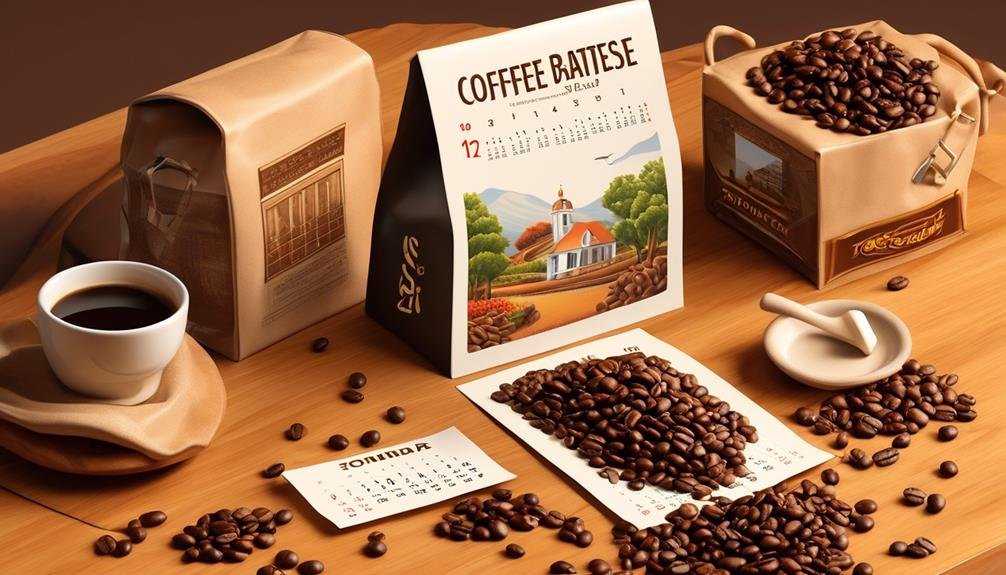Have you ever sipped on a cup of coffee that tasted stale, lacking that invigorating aroma and bold flavor? Just like time can erode the vibrancy of a sunset, it can also diminish the freshness of your beloved coffee beans.
But fear not, for there is a way to prolong the life of your coffee and ensure its delightful taste for as long as possible. In this discussion, we will unravel the secrets of coffee shelf life, exploring the factors that affect its freshness and the best storage methods to keep it at its peak.
So, grab your favorite mug and prepare to embark on a journey to preserve the essence of your morning ritual.
Key Takeaways
- Coffee is a perishable product with a shelf life of 2-4 weeks after the roast date.
- Proper storage is crucial for maintaining coffee freshness, including keeping it in a cool, dark place away from heat, light, and moisture.
- Grinding coffee just before brewing helps preserve flavors and aromas.
- Moisture, light, and heat can accelerate the degradation of coffee, leading to loss of flavor and potential spoilage.
Understanding Coffee Shelf Life
Understanding the shelf life of coffee is crucial to ensure its freshness and quality. Coffee is a perishable product, and its flavor and aroma can degrade over time. The shelf life of coffee depends on various factors, such as the type of coffee, the way it's packaged, and how it's stored.
Whole bean coffee has a longer shelf life compared to ground coffee. This is because grinding exposes more surface area to air, which accelerates the oxidation process. So, if you want to maximize the shelf life of your coffee, it's best to buy whole bean coffee and grind it just before brewing.
The way coffee is packaged also affects its shelf life. Coffee that's vacuum-sealed or stored in airtight containers can stay fresh for longer periods. This is because oxygen is the enemy of coffee freshness, and airtight packaging helps prevent oxidation.
Lastly, proper storage is essential for maintaining the quality of coffee. Coffee should be stored in a cool, dry place away from direct sunlight, moisture, and strong odors. It's best to transfer coffee to airtight containers if it comes in packaging that isn't resealable.
Factors Affecting Coffee Freshness
To maintain the freshness of coffee, it's important to consider various factors that can impact its quality over time.
One of the most crucial factors is exposure to oxygen. Oxygen causes coffee beans to oxidize, resulting in the loss of flavor and aroma. To minimize oxygen exposure, it's recommended to store coffee in airtight containers that can effectively seal out air.
Another significant factor is moisture. Moisture can quickly deteriorate the quality of coffee by facilitating the growth of mold and bacteria. Therefore, it's essential to store coffee in a dry environment away from humidity and moisture sources, such as the refrigerator or freezer.
Temperature also plays a vital role in preserving coffee freshness. Extreme temperature fluctuations can cause the coffee beans to expand and contract, leading to the loss of flavor compounds. It's best to store coffee in a cool, dry place away from direct sunlight and heat sources.
Furthermore, the grind size of coffee can impact its freshness. Pre-ground coffee has a larger surface area exposed to air, accelerating the oxidation process. Grinding coffee beans just before brewing helps retain the freshness and flavor.
Lastly, the quality of the coffee beans themselves is crucial. Specialty coffee beans, which are grown and processed with care, tend to stay fresh for longer compared to lower-quality beans.
How Long Does Roasted Coffee Last?
Roasted coffee typically maintains its optimal freshness for about two to four weeks after the roast date. During this time, the coffee beans undergo a process called degassing, where they release carbon dioxide. This degassing period is crucial for the coffee to develop its flavors and aromas. As the coffee ages, the carbon dioxide dissipates, and the flavors gradually deteriorate.
After the initial two to four weeks, the coffee is still safe to consume, but the quality starts to decline. The flavors become less vibrant, and the aroma fades away. Storing the coffee properly can help extend its lifespan. It's best to keep the coffee in an airtight container, away from heat, light, and moisture. These factors can accelerate the deterioration process.
If you want to enjoy the freshest cup of coffee, it's recommended to purchase coffee beans in smaller quantities and consume them within the optimal freshness timeline. However, if you have a larger supply of roasted coffee, you can still make use of it by using the beans for alternative brewing methods, such as cold brew or espresso.
Storing Whole Beans Vs. Ground Coffee
If you have a supply of coffee beans, whether they're whole or ground, proper storage is essential to maintain their freshness and quality. Storing whole coffee beans is generally preferred over ground coffee because the beans have a lower surface area exposed to air, which helps to preserve their flavor and aroma for a longer period of time. When coffee beans are ground, they release more oils and gases, making them more susceptible to oxidation and degradation.
To store whole coffee beans, it's recommended to keep them in an airtight container away from light, heat, and moisture. This helps to prevent the beans from absorbing any unwanted odors or flavors from the surrounding environment. Additionally, it's best to store the beans at room temperature, as extreme temperatures can negatively impact their quality.
On the other hand, ground coffee has a larger surface area exposed to air, making it more vulnerable to oxidation and loss of flavor. To store ground coffee, it's important to keep it in an airtight container in a cool, dark place. It's also advisable to use the ground coffee within a shorter period of time compared to whole beans to ensure the best flavor.
Best Storage Methods for Coffee
Proper storage methods are crucial for maintaining the freshness and quality of your coffee. To ensure that your coffee stays fresh for as long as possible, it's important to store it in the right conditions.
The ideal storage method for coffee is to keep it in an airtight container. Oxygen is the main enemy when it comes to coffee freshness, as it causes the beans to oxidize and lose their flavor. By using an airtight container, you can minimize the exposure of your coffee to oxygen, thereby preserving its freshness.
In addition to an airtight container, it's also important to store your coffee in a cool, dark place. Heat and light can degrade the quality of the coffee and accelerate its deterioration. Therefore, it's best to keep your coffee away from direct sunlight, as well as any heat sources such as stoves or ovens.
Furthermore, it's recommended to store your coffee away from strong odors. Coffee has a tendency to absorb odors from its surroundings, which can affect its flavor. To prevent this, it's advisable to store your coffee away from spices, herbs, or other strong-smelling substances.
Signs of Coffee Gone Bad
To determine if your coffee has gone bad, it's important to be aware of certain signs that indicate the deterioration of its quality and flavor. One of the first signs to look out for is a stale or musty smell. Fresh coffee has a strong, aromatic fragrance, but as it goes bad, it can develop a flat or unpleasant odor.
Another indicator is the taste. Coffee that has gone bad will have a noticeably bitter and sour taste, lacking the rich and smooth flavors that are characteristic of fresh coffee.
Additionally, the appearance of the coffee can provide clues. If you notice any mold or discoloration, it's a clear sign that the coffee has spoiled and shouldn't be consumed.
Lastly, the texture of the coffee can also change when it goes bad. It may become clumpy or have a gritty texture, which is a clear indication that it's no longer fit for consumption.
Tips to Extend Coffee Shelf Life
To extend the shelf life of your coffee, consider storing it in an airtight container in a cool, dark place. Here are some tips to help you maximize the freshness and flavor of your coffee:
- Use whole bean coffee: Whole beans have a longer shelf life than pre-ground coffee. Grinding the beans just before brewing helps to preserve the flavors and aromas.
- Avoid moisture: Moisture is the enemy of coffee. Make sure your storage container is airtight to prevent moisture from seeping in and causing the coffee to deteriorate.
- Keep it away from light and heat: Exposure to light and heat can accelerate the degradation of coffee. Store your coffee in a cool, dark place, away from direct sunlight and heat sources like the stove or oven.
Frequently Asked Questions
Can I Store Coffee in the Freezer to Extend Its Shelf Life?
You can extend the shelf life of coffee by storing it in the freezer. This method helps preserve its freshness for a longer period. However, be sure to use an airtight container to prevent moisture and odors from affecting the taste.
Does the Type of Coffee Bean Affect Its Shelf Life?
The type of coffee bean does affect its shelf life. Lighter roasts tend to have a shorter shelf life due to higher acidity, while darker roasts can last longer. Proper storage is still crucial for freshness.
Can I Still Use Coffee That Has Gone Past Its Expiration Date?
You can still use coffee that has gone past its expiration date. While it may not taste as fresh, it is generally safe to consume. Just make sure to store it properly in an airtight container to maintain its quality.
What Are the Signs That Indicate Coffee Has Gone Bad?
Coffee can go bad if not stored properly. Signs that indicate coffee has gone bad include a rancid smell, a stale taste, and the growth of mold. It is best to discard it if you notice these signs.
Can I Store Coffee in a Clear Glass Container?
You can store coffee in a clear glass container, but it's best to keep it in a dark, airtight container to prevent light and oxygen from degrading its quality over time.
Conclusion
In conclusion, the shelf life of coffee can vary depending on various factors such as storage methods, type of coffee, and packaging.
Roasted coffee typically lasts for about 2 to 4 weeks, while ground coffee may lose its freshness faster due to increased exposure to oxygen.
To extend the shelf life, it's recommended to store coffee in airtight containers away from heat, light, and moisture.
Monitoring for signs of coffee gone bad, such as a rancid smell or taste, is crucial to ensure the best coffee experience.




